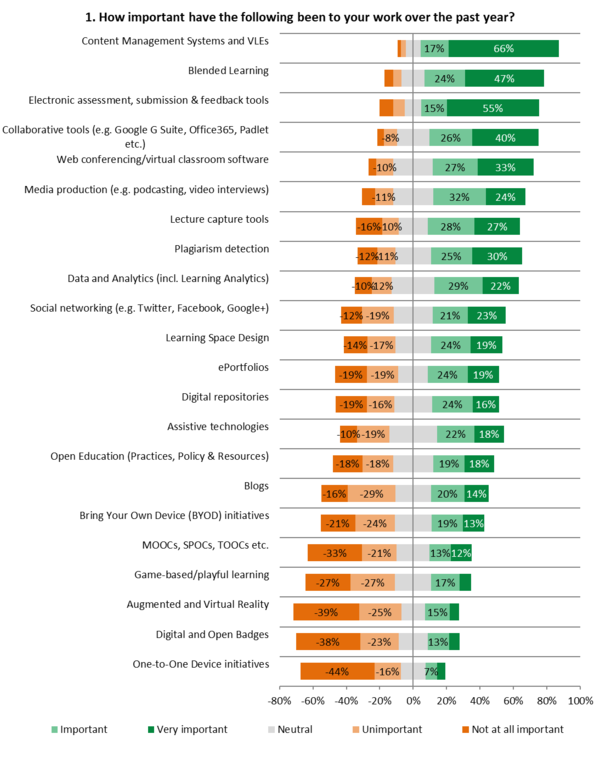Association for Learning Technology Annual Survey
Introduction
The ALT Annual Survey is conducted by the Association for Learning Technology (ALT), which represents individual and organisational Members from all sectors and parts of the UK. It defines learning technology as follows: “We define Learning Technology as the broad range of communication, information and related technologies that can be used to support learning, teaching and assessment. Our community is made up of people who are actively involved in understanding, managing, researching, supporting or enabling learning with the use of Learning Technology. We believe that you don't need to be called 'Learning Technologist' to be one.” (ALT home page, feb 2019).
Highlights from the fifth survey
As with previous years, the survey was advertised predominately to ALT Members but at the same time promoted publically. The ALT Annual Survey contains a common core of questions asked in all annual surveys. It is designed (quote) to:
- understand current and future practice;
- show how Learning Technology is used across sectors; and
- help map the ALT strategy to professional practice to better meet the needs of and represent our members. [1]
Let us quote two man insights from the page Findings from the 2018 ALT Annual Survey:
As with all previous ALT Annual Surveys the top enabler/driver for the use of learning technology is examined. In this area ‘Engagement from students/learners’ remains the top driver but this year saw ‘Dedicated time’ having the biggest change jumping from ranked 5th to 2nd. Taking in to account the survey results since 2014 the areas that have seen the biggest increases are ‘Professional incentives’, ‘Staff development opportunities’ and ‘Recognition for career development’.
[...] As with previous surveys ‘Content Management Systems and VLEs’ remains the top area of importance within current and future practice. ‘Blended Learning’ has overtaken ‘Electronic assessment’ in terms of ranked importance for current practice, but ‘Electronic assessment’ remains ranked second for future practice. ‘Lecture capture tools’ saw the greatest jump in importance in current practice, moving from 14th to 6th. ‘Assistive technologies’ continues to see strong increases in the importance for current practice.
Looking ahead to future priorities ‘Content Management Systems and VLEs’ and ‘Electronic assessment’ remain the top two future priorities. When comparing responses to last year’s survey ‘ePortfolios’ and ‘Assistive technology’ have seen the greatest increases in importance for future practice.Technologies used in 2018

Drivers identified in 2018

Trends
VLE's remain dominant. Technology brought in by outsiders who underestimate the challenges of education, e.g. MOOCs decline (naturally).

The five year trend of enablers and drivers can be summarized as "more of everything".

Links
- 2018 Data and Report page: https://repository.alt.ac.uk/2431/
Bibliography
Acknowledgement and copyright modifications
Contents of the report and the dataset are available under a Creative Commons Attribution 4.0. It can be summarized as follows: You are free to Share — copy and redistribute the material in any medium or format and to adapt — remix, transform, and build upon the material for any purpose, even commercially. Under the following terms: Attribution. You must give appropriate credit, provide a link to the license, and indicate if changes were made. You may do so in any reasonable manner, but not in any way that suggests the licensor endorses you or your use.
Contents of this page are available under the same Creative Commons Attribution 4.0 license.
Bibliography
- ↑ Hawksey, Martin (2019) Association for Learning Technology Annual Survey 2018 Data and Report. [Dataset] http://repository.alt.ac.uk/2431/